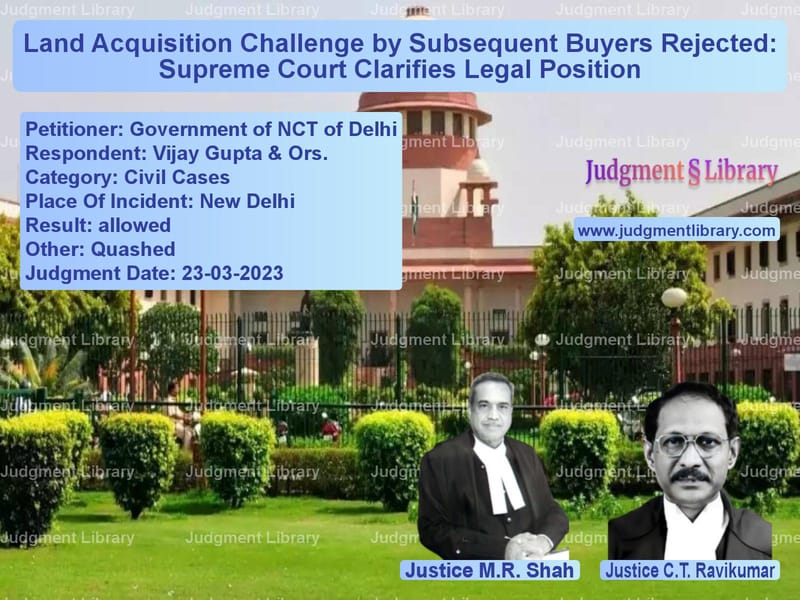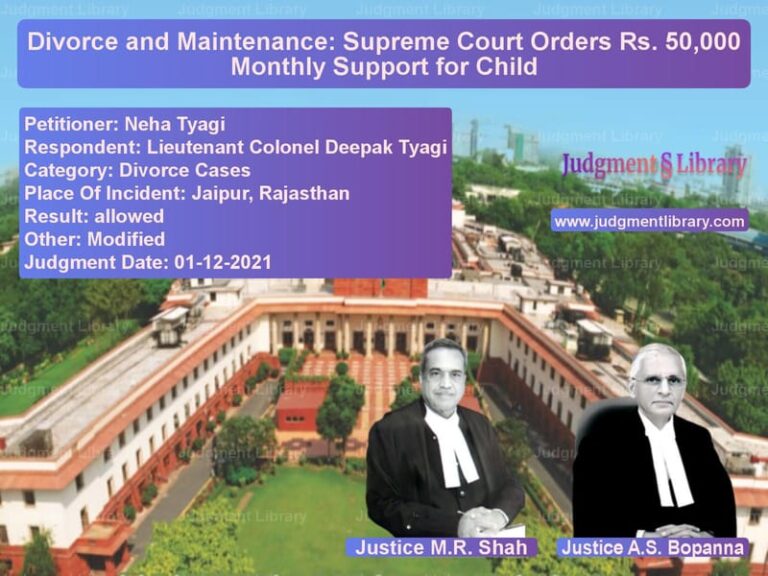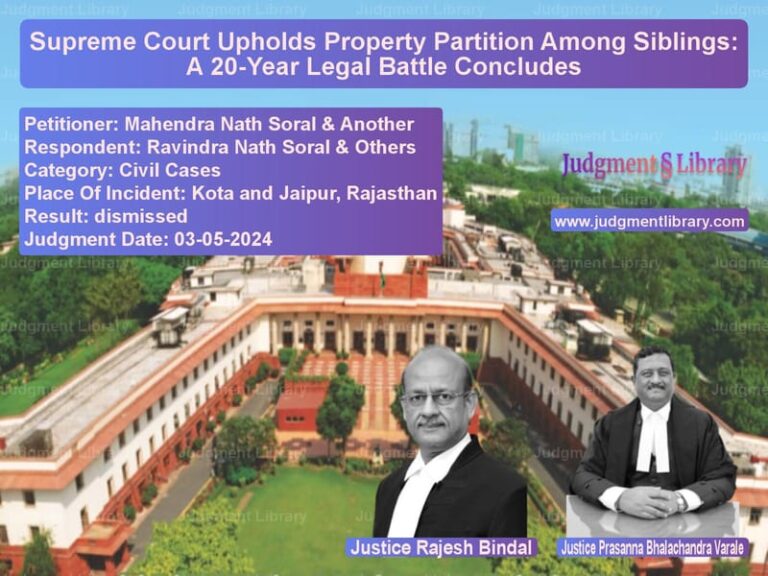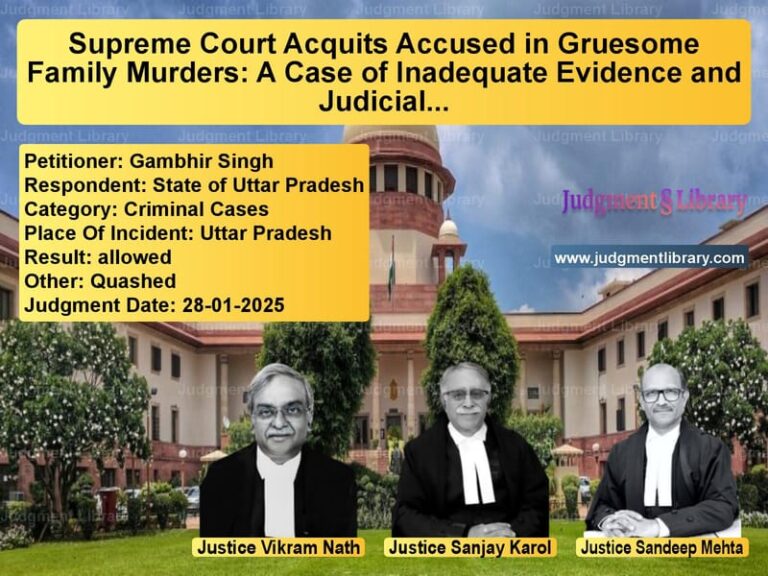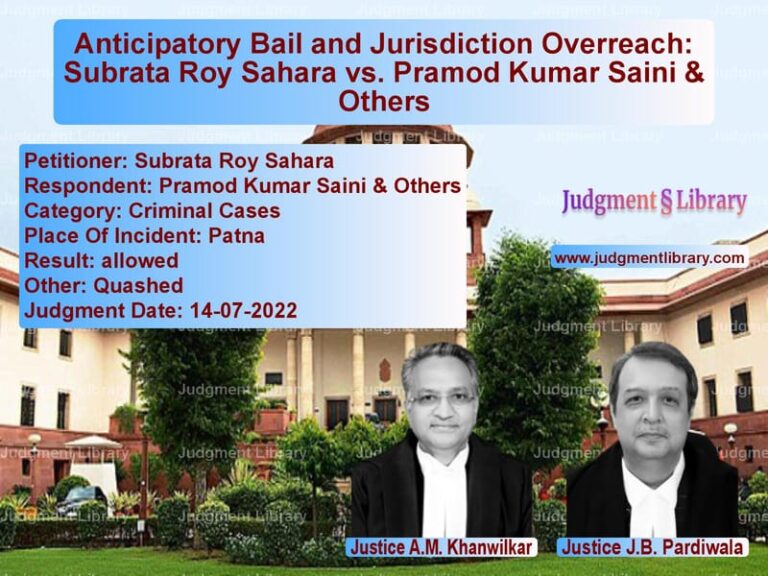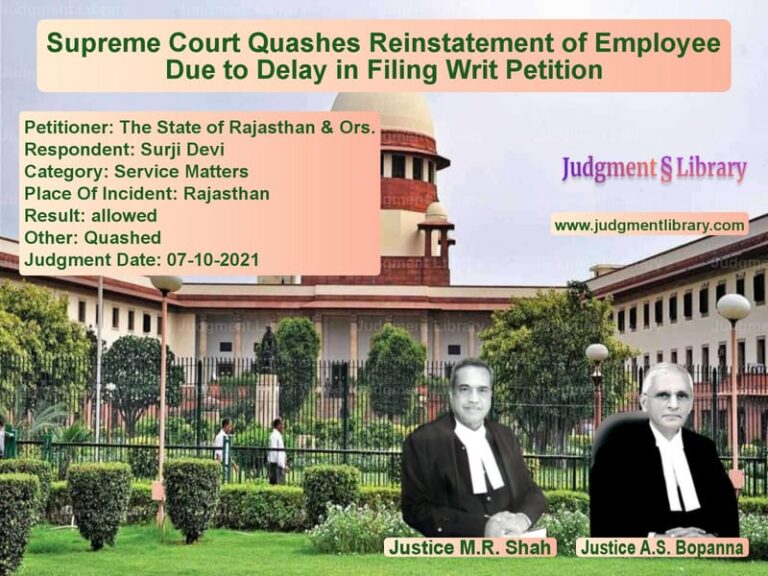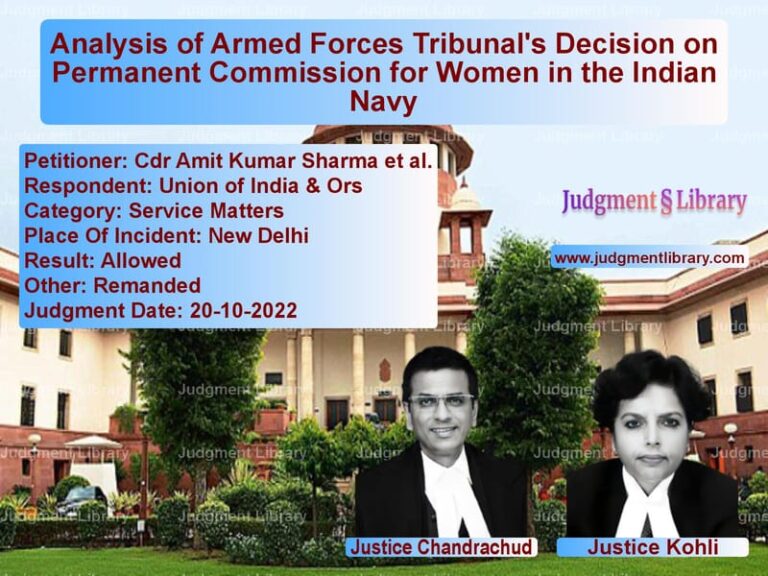Land Acquisition Challenge by Subsequent Buyers Rejected: Supreme Court Clarifies Legal Position
The Supreme Court of India recently ruled in Government of NCT of Delhi vs. Vijay Gupta & Ors. that subsequent purchasers of land have no right to challenge land acquisition proceedings or claim lapsing under Section 24(2) of the Right to Fair Compensation and Transparency in Land Acquisition, Rehabilitation, and Resettlement Act, 2013 (hereinafter referred to as the “2013 Act”). The Court overturned the Delhi High Court’s judgment, which had declared the land acquisition lapsed.
Background of the Case
The dispute pertained to land in Delhi acquired under the Land Acquisition Act, 1894. The original landowners did not challenge the acquisition. However, the respondents, who were subsequent purchasers, filed a writ petition in the Delhi High Court, arguing that the acquisition should be deemed to have lapsed under Section 24(2) of the 2013 Act. The High Court accepted their claim and ruled in their favor.
Key events in the case:
- The notification for acquisition was issued under the 1894 Act.
- The original landowners did not object to the acquisition.
- The respondents acquired the land after the acquisition notification.
- The respondents approached the High Court, claiming lapsing of the acquisition under the 2013 Act.
- The Delhi High Court ruled in favor of the respondents.
- The Government of NCT of Delhi challenged the High Court’s decision in the Supreme Court.
Arguments by the Appellant (Government of NCT of Delhi)
- The High Court erred in entertaining the petition of subsequent purchasers who had no legal right to challenge the acquisition.
- The respondents lacked a valid title deed, as their claims were based on general power of attorney, will, and receipt, which do not confer ownership rights.
- The High Court wrongly relied on Government (NCT of Delhi) vs. Manav Dharam Trust & Anr. (2017), which had already been overruled in subsequent judgments.
- Under the Supreme Court’s rulings in Shiv Kumar & Anr. vs. Union of India & Ors. (2019), Delhi Development Authority vs. Godfrey Phillips (I) Ltd. & Ors. (2022), and Delhi Administration vs. Pawan Kumar & Ors. (2022), subsequent purchasers have no right to challenge land acquisition.
- The acquisition process was legally completed, and the claim of lapsing was invalid.
Arguments by the Respondents (Vijay Gupta & Ors.)
- The respondents argued that since compensation was not paid to the original landowners, the acquisition should be considered lapsed under Section 24(2) of the 2013 Act.
- They claimed to have rights over the property based on documents such as general power of attorney, will, and payment receipts.
- The Delhi High Court correctly ruled in their favor, applying the 2013 Act’s provisions.
Supreme Court’s Observations and Ruling
The Supreme Court dismissed the High Court’s decision and reaffirmed the settled legal principle that subsequent purchasers cannot challenge land acquisition. The Court made the following key observations:
- The respondents purchased the land after the acquisition process was initiated under the 1894 Act.
- Their claims were based on general power of attorney, will, and receipts, which do not establish valid ownership.
- The Supreme Court had already ruled in Shiv Kumar and other cases that subsequent purchasers do not have the right to challenge land acquisition or seek lapsing.
- The High Court’s reliance on Manav Dharam Trust was incorrect, as that decision had been overruled.
- The acquisition process was valid, and there was no deemed lapse under Section 24(2) of the 2013 Act.
The Court categorically stated:
“As per the law laid down by this Court in the case of Shiv Kumar & Anr., a subsequent purchaser has no locus to challenge the acquisition or lapsing of the acquisition.”
Final Judgment
The Supreme Court allowed the appeal and ruled that:
- The High Court’s judgment was quashed.
- The land acquisition process was upheld as valid.
- The respondents had no legal standing to challenge the acquisition.
- The claim of lapsing under Section 24(2) of the 2013 Act was rejected.
Implications of the Judgment
The ruling has several important implications:
- Prevention of Unwarranted Challenges: It clarifies that subsequent buyers cannot interfere with land acquisition proceedings.
- Certainty for Public Projects: Ensures that infrastructure and development projects are not delayed by speculative land transactions.
- Protection of Government Acquisitions: Strengthens the validity of acquisitions under the 1894 and 2013 Acts.
- Legal Clarity: Reaffirms that property transactions based on power of attorney, will, and receipts do not confer ownership.
Conclusion
The Supreme Court’s ruling in Government of NCT of Delhi vs. Vijay Gupta & Ors. reinforces the principle that land acquisition proceedings cannot be challenged by individuals who purchase land after the acquisition process has been initiated. This decision upholds the rule of law, prevents unnecessary litigation, and ensures that public infrastructure projects are not hindered by speculative transactions. It serves as a crucial precedent for future land acquisition cases and protects the interests of the government and legitimate stakeholders.
Petitioner Name: Government of NCT of Delhi.Respondent Name: Vijay Gupta & Ors..Judgment By: Justice M.R. Shah, Justice C.T. Ravikumar.Place Of Incident: New Delhi.Judgment Date: 23-03-2023.
Don’t miss out on the full details! Download the complete judgment in PDF format below and gain valuable insights instantly!
Download Judgment: government-of-nct-of-vs-vijay-gupta-&-ors.-supreme-court-of-india-judgment-dated-23-03-2023.pdf
Directly Download Judgment: Directly download this Judgment
See all petitions in Property Disputes
See all petitions in Landlord-Tenant Disputes
See all petitions in Specific Performance
See all petitions in Judgment by Mukeshkumar Rasikbhai Shah
See all petitions in Judgment by C.T. Ravikumar
See all petitions in allowed
See all petitions in Quashed
See all petitions in supreme court of India judgments March 2023
See all petitions in 2023 judgments
See all posts in Civil Cases Category
See all allowed petitions in Civil Cases Category
See all Dismissed petitions in Civil Cases Category
See all partially allowed petitions in Civil Cases Category

